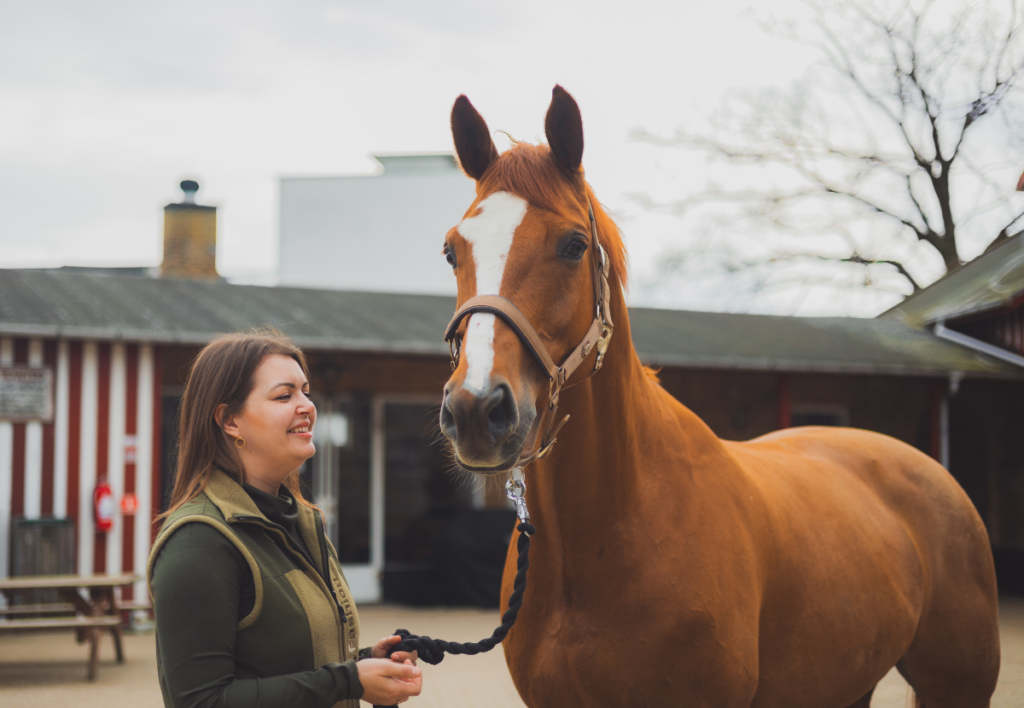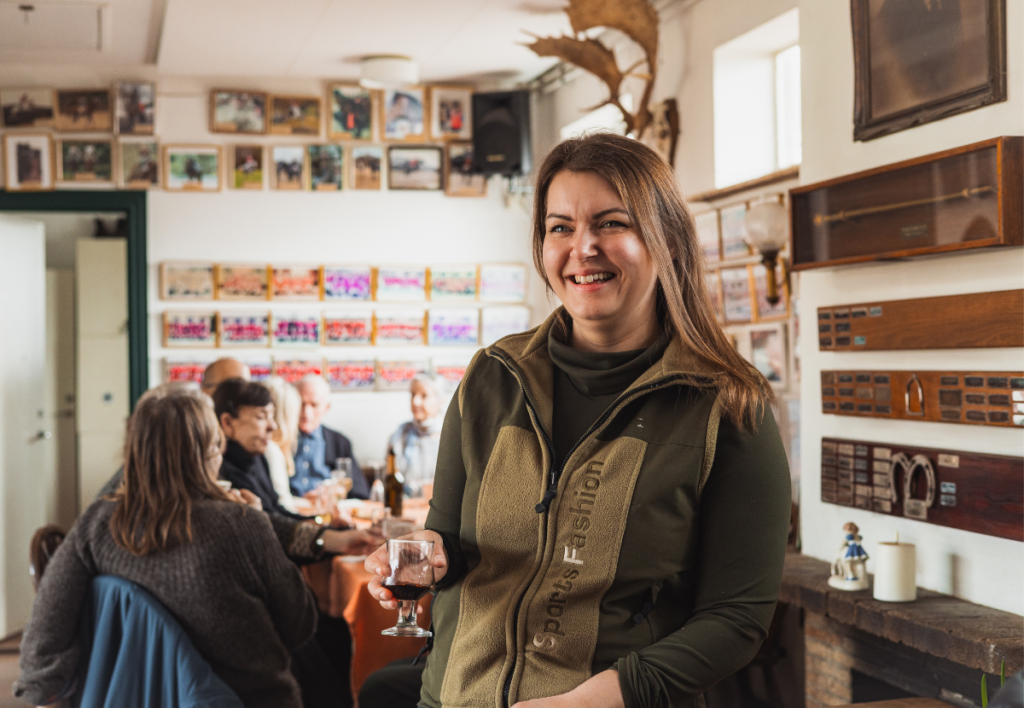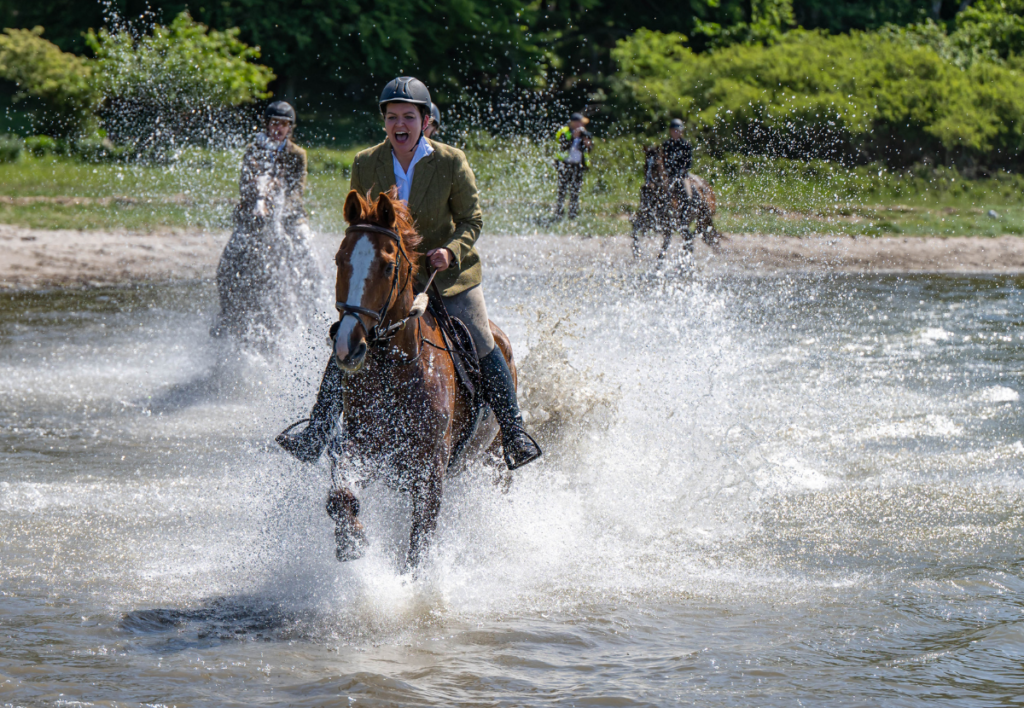Menu

Some might say that Mattsson's Riding Club has a companionship that goes beyond the usual. When we entered the courtyard, we were greeted by the weekly champagne club in the rider's lounge and a middle-aged man in riding gear, who told us that he had visited everyone in the rider's lounge, and so had the others. As per tradition, port wine is consumed in quantities that other riding clubs can seldom match, and the place is teeming with people, horses, and dogs even on a Friday morning at 10. But what makes the relations so special at this red and white painted riding club near Copenhagen?
Equestrian sports, regardless of discipline, are primarily individual sports, where the presentation and interplay between horse and rider are crucial. Yet, no one can do it alone. The social support from the community is more important than we might think. This is especially important for the head chef at Cofoco, Annie Ursula Laurie, who is also a rider and horseperson through and through.
The 34-year-old chef grew up in a small village in Jutland, and she has always been close to horses. She tells us that the horses further up the road always caught her attention, and Annie and her sister rode the neighbor's horses for many years. Naturally, this evolved for the young girl.
“After a few years, we got the farmer's old horse and a retired trotter, and then we rode a lot in the forest and jumped and had fun.”
Annie
Although the young rider did not realize it at the time, this was the start of a journey towards having her own hunt horse and riding daily in one of Denmark's most coveted forests, namely Dyrehaven. However, the journey was interrupted during her teenage years, and time for the horses disappeared. It was only when Annie hit her early twenties that she realized horses were far more important to her than initially thought.

Throughout her twenties, Annie had horses close to her life through various partners around the country. She always sought a horse to care for wherever her work took her. But it was when her close friend and riding mentor Niels Tind passed away that life with horses took off.
She inherited two horses from him, a mare and a young gelding. They were loaded into a trailer, and the contrast from a field in Jutland to Mattsson's Riding Club just outside Copenhagen was quite a change for the horses. But as many others – including Annie herself – would have assumed, it did not affect the two horses particularly. It was almost the opposite for the nine-year-old gelding Two Socks (commonly called Sokken, Danish for Socks). Annie describes how the development has progressed, and it seems like he lacked the extra stimulation that comes when a riding club is next to an S-train station and a gas station. The mare was subsequently sold to a close friend, as two horses and a full-time job were too much for Annie.
But the challenge of suddenly having a horse and a demanding job has not been straightforward.
“I have a very hectic daily life. Since I am in a kitchen, and it's busy, and I have all these sub-goals during the day that I need to achieve within a certain time limit, it can be extremely stressful.”
Annie
But incredibly, Annie found out that it was precisely the horses that could give her calm in her daily life. Horses do not cause the stress one might otherwise be tempted to think they would.
"With the horses, I really find peace. Either in the forest or if I get dressage lessons.”
Stress is often caused by having too many balls in the air. It often arises when one does not think one can manage everything one needs to do. When one is stressed, one thinks about the future and many things at once. What being with the horses forces one to do is to be present at the moment and relate to what one's body and mind are doing right then and there. It brings peace because one is forced to let go of all the other thoughts that are otherwise running around in one's head.
“One of my major challenges is that I am always thinking, so when I am with the horses, I focus on them and find enormous peace in that.”
Annie
For many of us, being with horses allows us to break away from the hustle and bustle that a typical day often presents. This state is called being in flow and can be defined as a state of self-forgetful absorption. It is often associated with forgetting time and place along with a feeling of meaning and satisfaction.
Although a job as a head chef can encroach on the social life that often takes place in the evenings when other people are free, Annie enjoys being in the stable while it is light. Moreover, Annie's daily life is also cohesive because she gets indispensable help with the horse.
“I start work at noon, so I have the whole morning to ride and care for the horses. Besides, I have two fantastic partners and friends here from the riding club, who have been a huge help. Especially during the time when I was with two horses.”
Annie
Without proper backup, it is difficult to integrate life with horses with a demanding job. Annie still has one major challenge when making her daily life work.
“For me, it's guilt. When Two Socks gets mud fever, why did he get it, why didn't I prevent it a bit better?”
Annie
The active rider says the best solution she has found is to have a support team she can trust. In this way, she can always seek help, advice, and guidance, which can somewhat alleviate the guilt.

The journey with horses has not always been a bed of roses.
“I have always suffered from insecurity over the years. When I had to ride in the riding arena, I would check to see if there was anyone in the riding house because I didn't want anyone to see me.”
Annie
But gradually, the development with horses has given Annie the missing confidence, which has only grown since she got her own horse. She emphasizes that the camaraderie and support she received at Mattsson's Riding Club have significantly impacted her self-development.
“As the years have passed and especially as I have been out with hunt riders, I have gained confidence and learned that I am good enough and it's okay if I can't figure it all out.”
Annie
As a hunting rider, one rides in the actual field, which is the group of horses and riders that ride the hunt together. As part of the field, one rides over jumps and through obstacles such as the water ditch, and one rides in the final stretch at the end. As a following field, one rides along, but without jumps and obstacles. It can be a good way to start one's hunting career, or if one has a very young horse, as there otherwise can be a lot to deal with all at once as a hunt rider or horse in the field.
Although a good background and support are essential for Annie to be able to maintain horses in her life, she also tries to listen to herself and make her own decisions.
“By getting my own horse, I am forced to trust my gut feeling about it. I have been forced to be more attitude-oriented and make some decisions myself, and it has really developed me – both personally and as a rider.”
Annie
“Horses have meant peace, a sense of responsibility, and personally, I have grown in the whole task of having a horse.”
Annie has a tip that many of us could probably use in our journey with horses: “It's okay to have challenges with your horse, you don't have to be perfect.”
So, remember that next time you and your horse go to a competition site, out in the forest, to a lesson, or just for a walk. It doesn't need to be perfect, for companionship is the most important.
